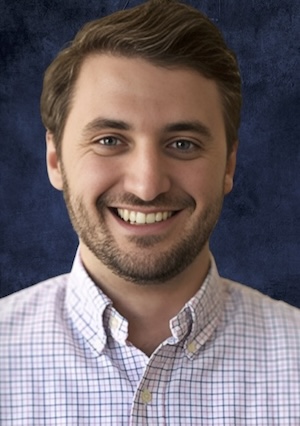Triple Gator graduate Matthew Diller pursues his calling in biomedical informatics

Matthew Diller
Finding that perfect career pathway isn’t always easy, especially when you’re an uber-inquisitive student with a hyperactive mind like Matthew Diller.
The current UF doctoral graduate was rife with scientific curiosity as an undergrad, but he often struggled to channel his academic interests – from philosophy to neuroscience – into one field. That was, until he discovered the endlessly fascinating world of biomedical informatics.
Less than a decade ago, this was a new concept at UF. A graduate program was just emerging, and it combined a little bit of everything Diller loved – data science, artificial intelligence, medicine, philosophy, and information technology. Biomedical informatics was about making sense of the massive amounts of data produced daily in the health care industry to catalyze medical breakthroughs and improve public health. Diller saw himself using data to truly help people lead better lives, and he knew this was the field that fit him.
So he joined the first cohort of the master’s program in 2016 and, on May 2, he will graduate with a doctoral degree in medical sciences and a concentration in biomedical informatics. Many students have since followed Diller’s trajectory and, today, the College of Medicine’s Department of Health Outcomes and Biomedical Informatics has 49 enrolled graduate students and 187 research projects underway.
“I just fell in love with the field,” said Diller, who has already accepted a prestigious role as postdoctoral trainee at the National Institutes of Health, where he will work under the scientific director of the National Library of Medicine. “I love looking at data and how it relates to a person’s health. This field is all about how we can use data and computers for solving real-world biomedical problems.”
The magic of mentorship
Diller first arrived at UF in 2010 from his hometown of West Palm Beach, Florida, and he was working toward a bachelor’s degree in philosophy from the College of Liberal Arts and Sciences when his life abruptly changed.
“By complete chance, I ended up meeting my mentor, Dr. Bill Hogan, while I was working as a student assistant in 2014, right before I graduated with my bachelor’s degree,” Diller said. “He asked me if I was interested in learning about the research he does, which is at the intersection of medicine, philosophy, and artificial intelligence. After meeting with him a few times, I decided to learn more about biomedical informatics and these semantic web technologies he was using.”
Hogan, who is currently the Mary T. and Ted D. Kellner Chair of Data Science at the Medical College of Wisconsin, was the director of UF’s Division of Biomedical Informatics at the time.
“Matt started working with me on one of my grants; we were building data standards for the initialization and output of infectious disease epidemiology models. Matt was a terrific student and I appreciated the enthusiasm he brought to the work,” Hogan said. “Matt is graduating with an impressive piece of dissertation work, and he will go on to a postdoctoral fellowship, working for one of my dearest colleagues.”
Hogan believes that the field of biomedical informatics can be transformative for students and for the world.
“It’s still a young field and we’re figuring out a lot of things, but it has already changed the world when you look at electronic health records in clinical care and the volumes of data they generate for research,” Hogan said.
Real-world solutions
Diller’s doctoral dissertation was an example of that kind of impactful, usable research. Entitled “An Advanced Ontology-Based Approach to Semantic Data Integration for Exposome Research with a Focus on External Environmental Exposures and Temporal Relations,” it was basically about how Diller built a database that public health researchers could use to keep patients safer and healthier.
Diller pulled information about environmental factors from existing datasets (published by organizations like the U.S. Environmental Protection Agency, the United States Postal Service, and the National Oceanic and Atmospheric Association) and connected them by location and time period.
“My database has meteorological data, crime stats, neighborhood walkability information – each from individual datasets but transformed into a uniform format and stored,” Diller said. “I have a representation of Alachua County, Florida, for example, showing the levels of carbon monoxide in the area, as well as the walkability of the little neighborhood I live in in Gainesville. I’m looking at the data and how it relates to a person’s health. What I’m doing adds a little more information to the data to help people determine whether they can use it for their own lives.”
Diller’s mentors see the incredible potential in databases like these, and in thoughtful researchers like him.
“Matt’s dedication to advancing ontology-based semantic data integration for exposome research is commendable,” said Jiang Bian, Ph.D., the division director for UF’s biomedical informatics program. “We eagerly anticipate the contributions he will continue to make to the field in the years ahead.”
For Diller, stumbling upon biomedical informatics has been a fortuitous and fulfilling adventure.
“I never expected to find this field. I struggled a lot in undergrad and I found classes to be a bit overwhelming at times,” Diller said. “But then I found this. I’m so grateful for the work I did in that research lab with Dr. Hogan that pointed me in this direction. I really love what I’m doing.”
